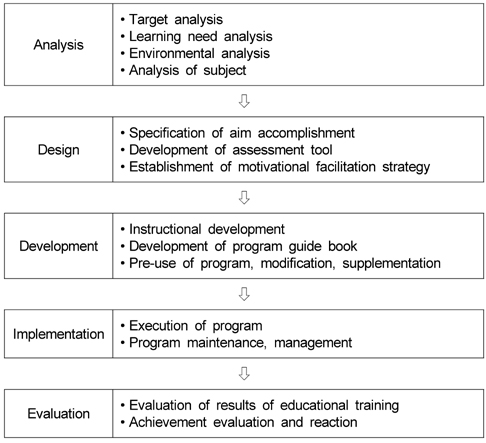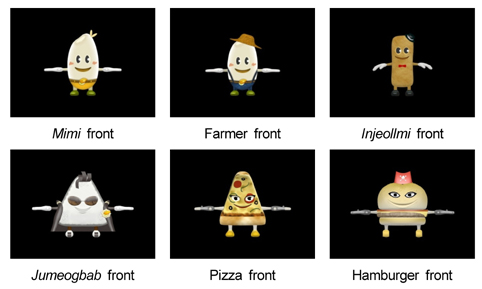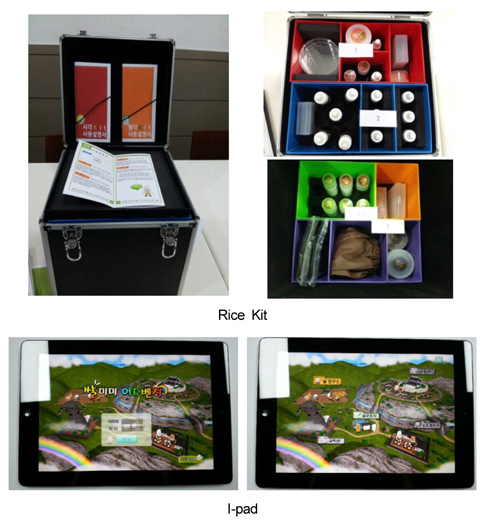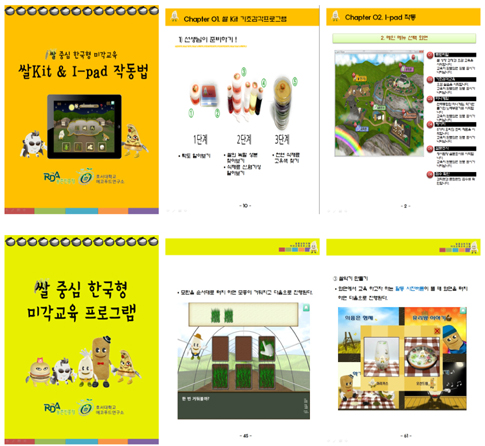Nutr Res Pract.
2014 Feb;8(1):112-119.
Sensory education program development, application and its therapeutic effect in children
- Affiliations
-
- 1Department of Food and Nutrition, Hoseo University, 20, Hoseo-ro 79, Asan, Chungnam 336-795, Korea. kimmihye92@hoseo.edu
- 2Department of Food and Nutrition, Hoseo University, Chungnam 336-795, Korea.
Abstract
- There has recently been Increased interest in the emotional intelligence (EQ) of elementary school students, which is recognized as a more important value than IQ (intelligence quotient) for predict of their success in school or later life. However, there are few sensory education programs, available to improve the EQ of elementary school student's in Korea. This study was conducted to develop an educational program that reflects the characteristics and contents of traditional rice culture and verify the effects of those programs on the EQ of children. The program was developed based on the ADDIE (Analysis, Design, Development, Implementation and Evaluation) model and participants were elementary school students in 3rd and 4th grade (n = 120) in Cheonan, Korea. Descriptive statistics and paired t-tests were used. EQ scores pertaining to the basic sense group, culture group, and food group were significantly improved after the sensory educational program(P < 0.05), but no change was observed in the control group. These findings indicate that sensory education contributed to improving elementary school children's Emotional Intelligence (EI) and their actual understanding about Korean traditional rice culture.
Figure
Reference
-
1. Kim KY. The study of fluence theory a forefinger learning instruction cooking-taste in the self-filial piety. Korea J Tourism Hosp Res. 2012; 26:385–402.2. Mustonen S, Rantanen R, Tuorila H. Effect of sensory education on school children's food perception: a 2-year follow-up study. Food Qual Prefer. 2009; 20:230–240.
Article3. Uchisaka Y. Sensory Education in Class. Tokyo: Godo-Shuppan;2007. p. 64–73.4. Reverdy C, Chesnel F, Schlich P, Köster EP, Lange C. Effect of sensory education on willingness to taste novel food in children. Appetite. 2008; 51:156–165.
Article5. Cho EY. A study on learning factors and self-accomplishment of culinary tastes sense education [master's thesis]. Suwon: Kyonggi University;2011.6. Chung O, Kim M, Rho S, Park Y, Chung S, Lim J. A study on the development and effects of a program for nurturing children's emotional intelligence. Korean J Hum Dev. 2010; 17:191–209.7. Ha TY. Health functional properties of rice. Food Ind Nutr. 2008; 13:22–26.8. Wi JH, Won ES. Effectiveness of G-learning math class in increase of math achievement of K-5 students in USA. J Korea Game Soc. 2012; 12:79–90.
Article9. Eun KH, Ryu SH. The development case of G-learning based education contents. J Digit Policy Manage. 2013; 11:397–402.10. Kim HJ. A study on the current status and exploring the new possibility of dietary education for school children: focusing on sensory education. J Korean Pract Arts Educ. 2012; 26:59–82.11. Woo T, Lee KH. Development of a sensory education textbook and teaching guidebook for preference improvement toward traditional Korean foods in schoolchildren. Korean J Nutr. 2011; 44:303–311.
Article12. Park BK. Taste education program development, application and its therapeutic effect in school children [doctorate's thesis]. Seoul: Ewha Womans University;2013.13. Lee CH. Model development and application of creative engineering design education program based on ADDIE model. Korean J Technol Educ. 2008; 8:131–146.14. Moon YL. Measuring emotional intelligence: a case in Korea. SNU J Educ Res. 1996; 6:11–30.15. Lee JI, Min KH. Emotional intelligence: its conceptualization and research perspectives. Psychol Sci. 1996; 5:67–84.16. Lee S, Kim Y. The effect of the various musical activities to emotional intelligence of children. J Hum Ecol. 2006; 7:17–29.
- Full Text Links
- Actions
-
Cited
- CITED
-
- Close
- Share
- Similar articles
-
- Effects of sensory education based on classroom activities for lower grade school children
- Development and Application of Sexual Health Education Program for Unmarried Mothers
- The Effect of Nutrition Education Program for Elementary School Children: Especially Focused on Being Familiar with Vegetables
- Effects of A Sensory Stimulation Program on Growth and Behavioral Development of Infants
- The Development and Evaluation of a Nutrition Education Program including Sensory and Cooking Activity to Promote Vegetable Intake among School Aged Children







